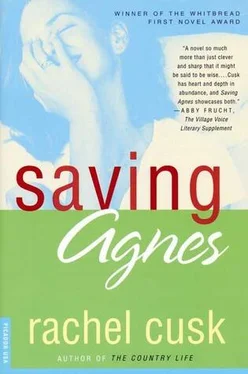‘Come on, Dad,’ he said. ‘You can’t sit in the back seat like someone’s old granny. You drive.’
‘Not at all,’ declined their father politely. ‘I’m quite happy being chauffeured about. I’ve got Agnes here to keep me company. You sit up there with your mother.’
‘Oh, all right,’ grumbled Tom, getting in. ‘But I hope you realise this is playing havoc with my masculine role-models.’
Agnes was becoming increasingly aware that her father was happy to take the back seat not just in the most literal of senses. She looked at him as the car pulled out on to the road, and saw in the harsh daylight that his hair had now turned completely white.
‘Dad, you’re so old!’ she almost said; but managed ‘I’m so cold!’ instead.
‘No stamina,’ he replied, fumbling about behind him for a rug. ‘There, that should fix it.’
He had, she saw, long since substituted kindness for authority. Leaning against him with the gentle pull of the car, her mother’s grey head bobbing serenely in front of her, Agnes saw in the cycles of all their ageing new evidence of compatibility. They too, she realised, had once been children. They didn’t ask to be born either.
‘Shall we have a fire?’ said Agnes’s mother when they got home. The wind had grown fiercer overnight and was whining beneath the door jambs and round the window-panes.
‘Good idea,’ said her father. ‘I’ll chop some wood.’ He waited hopefully for someone to relieve him of the burden of his offer. ‘Unless Tom feels like hefting an axe,’ he added, when no one did.
‘Do I have to?’ said Tom, whose masculine role-models were evidently once more intact.
Agnes offered to assist him, and the two of them made their way out to the old shed where their father had used to breed rabbits. Their community had long since become extinct, and the ruins of old hutches were stacked against one wall to make room for the woodpile, which, Agnes’s father had found, required less upkeep and could be consumed without undue sentiment.
The shed smelt mouldy and dank. It was a country smell, strong and not altogether unpleasant. It summoned equally strong memories. She could not recall having smelt anything so pungent in her years away from home. The odour gave her a strange sense of those years being effortlessly wiped away. The life she had left behind only yesterday seemed already indistinct.
‘This won’t be enough,’ said Tom, examining the small pieces he had gathered from the floor of the shed and thrown into the large basket they had brought with them.
He picked up an axe and began chopping more wood. The pieces cleaved cleanly from the gnarled blocks, as if they had always had within them the seeds of separateness. A fresh smell of pencil shavings wafted through the shed.
‘Can I have a go?’ said Agnes.
‘Okay.’ Tom looked at her doubtfully. ‘Be careful, though. You could cut yourself. It’s sharp.’
Agnes reined in a remark concerning the contrasting bluntness of his views on gender stereotypes.
‘Put your hands lower down,’ said Tom, observing her critically. ‘No, not like that. You have to bring it down harder. Put your foot on it, woman. That way it doesn’t roll.’
She hefted the axe and brought it down on the block of wood. It split into two with a sharp crack.
‘Bull’s-eye!’ she said gleefully.
‘Now cut those into two. They’re too big.’
‘They are not! Leave them alone. They’re perfect.’
‘They’re too bloody big.’ Tom sat down on the woodpile. ‘Go on, let’s see you do it again.’
‘Okay.’ Agnes raised the axe above her head. ‘Watch this.’
The block of wood toppled over on impact and was sent spinning away to the other side of the shed. Tom began clapping sarcastically.
‘Shut up!’ Agnes went to retrieve it. ‘I was just practising.’
Her next blow was more successful. She threw the logs in the basket and picked up another block. She had begun to work up quite a sweat.
‘Let’s have a go,’ said Tom.
‘No.’ Agnes wielded the axe. ‘I’m enjoying myself. Besides, I’m armed and dangerous.’
‘It was only a matter of time,’ mumbled Tom.
They picked up the basket and carried it by the handles back to the house.
‘I did more than you,’ said Agnes.
‘Well, that’s not my fault. You wouldn’t let me do any. Anyway, mine are better than yours.’
‘They are not!’
‘They bloody well are. Mine are art.’
They staggered into the kitchen and put down the basket.
‘Oh, well done,’ said their mother, beaming at her united offspring hopefully. ‘So, did you have a nice chat?’
‘Agnes is too macho to chat.’
‘Tom’s a male supremacist. He couldn’t chat to a woman unless she was gagged and tied to a chair.’
‘Really, Agnes! Do you have to be so vulgar?’
‘Who’s vulgar?’ inquired their father, looking up from the paper.
‘Never mind, Alex.’
‘I must say, I do object to what they show on the television. I can hardly understand what they’re saying these days. All they seem to do is jump in and out of bed, as if that was all anybody did!’
‘Lunch is ready,’ said their mother firmly.
‘How’s your love life, Agnes?’ persisted her father; a question he had put with increasing frequency over the years, as he realised that something in his general bearing safeguarded him from receiving any kind of detailed answer.
‘I don’t have a love life, Dad. I’m too busy.’
‘She has a kind of love time-share,’ interjected Tom.
‘Besides,’ Agnes confessed, ‘there’s no one around these days — no one that I like, anyway.’
‘Don’t know what’s got into chaps these days,’ said her father. ‘Pretty girl like you. In my day they would have been queuing up at your door. These days they queue up for social security.’
There was a moment’s silence in honour of the death of romantic England.
‘I can’t think why they call it security,’ opined her mother, putting dishes on the table. ‘Tom feels very insecure without a job, don’t you, dear?’
Agnes and Tom glanced at each other across the table. Tom raised one eyebrow and began passing plates around in silence. A few minutes later, however, a loud guffaw escaped from their father’s lips. He leaned over and patted his wife’s arm fondly.
‘That was very good, dear,’ he said. ‘Very good.’
‘They’re both completely bonkers,’ said Tom. He turned around and looked at the house, from which they had just emerged to go for a walk. ‘Good thing they live out here, at any rate.’
‘What do you mean?’ said Agnes.
‘Well, if they lived anywhere else they’d probably have been locked up by now. I suppose it’s one of the privileges of wealth. You can go nuts in your own secluded home.’
Agnes thought she detected something untoward in his tone, as if he meant it seriously. She did not respond. They were approaching the very spot where they had argued several weeks before, the ill-feeling of which occasion was still fresh enough in her memory to make her not want to resuscitate it.
‘So what’s wrong with you?’ said Tom suddenly.
‘Nothing.’ Agnes opened the small gate at the bottom of their garden and strode out into the field beyond. ‘Why do you ask?’
‘Dunno. I just thought you only came home when you had something to moan about.’
‘You should know by now,’ retorted Agnes, becoming riled, ‘that I like to have the occasional luxury break from my spartan socialist existence. And I really don’t see why you’re trying to wind me up.’
Agnes delivered this speech with the dawning consciousness that Tom was, rather than attempting to detect dark motives for her own presence here, probably merely trying subtly to illuminate a conversational path towards his own. He had just lost his job, for goodness’ sake, thought Agnes. She resolved to be more patient.
Читать дальше












